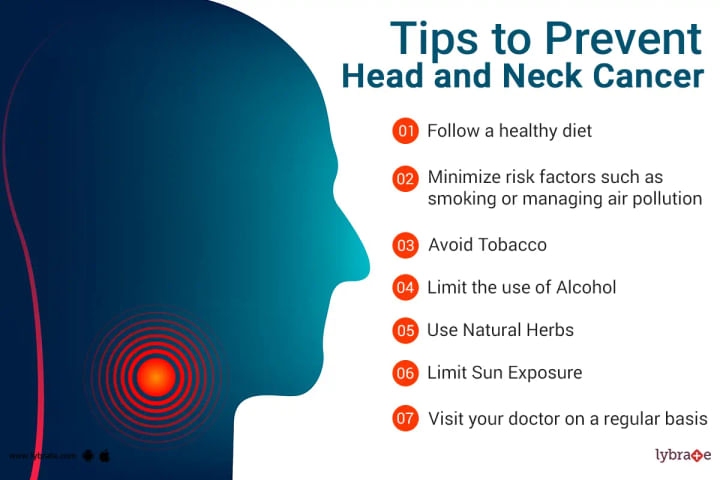Head and Neck Cancer: Risk Factors and Prevention
What is Head and Neck cancer?
Head and neck cancer are a group of cancers that originate in the head or neck region, including on and around the lips, tongue, throat, sinuses, and nasal cavity. These cancers are typically divided into two types: squamous cell carcinomas (cells that line the hollow organs of the body) and non-squamous cell carcinomas (any type of cancer that does not form these cells). Head and neck cancer can be caused by tobacco use, alcohol use, genetics and other environmental factors.
What are the signs and symptoms of Head and Neck cancer?
The following are some common signs and symptoms of head and neck cancer:
- A lump or sore in the head or neck that does not heal.
- Sore throat that does not go away.
- Swelling of the jaw or face.
- Trouble swallowing.
- Unexplained weight loss.
- Chronic hoarseness, coughing or change in voice.
- Ear pain and hearing loss.
- Unusual bleeding from the nose or mouth area.
- Pain in the neck, jaw or face that does not go away.
What are possible complications of Head and Neck cancer?
Head and Neck cancer can lead to a wide range of complications, such as:
- Difficulty swallowing,
- Breathing problems,
- Speech and hearing impairments,
- Vision loss,
- Pain and discomfort in the neck or head area,
- Facial disfigurement due to skin damage or surgery,
- Nutritional issues caused by difficulty in eating or digesting food properly,
- Infection of the surgical wound site,
- Frequent and severe nose-bleeds due to increased vascularity of the mucous membranes of the head and neck region.
- Head and Neck cancers may cause disruption to the nerves providing sensation from the facial area. This can lead to numbness on one side or drooping in part of your face. There are many membrane linings throughout the respiratory tract (such as larynx) that can become damaged by head & neck cancers causing dryness, dysesthesias not only around vocal cords but elsewhere too such as teeth.
- The cancer may spread via local lymphatics producing enlarged lymph nodes within the neck making it appear swollen; if present these would increase risk for carotid artery dissection or airway compromise requiring intervention.
- Head & neck malignancies also increase risk for developing second primary malignancy thus increasing morbidity rate significantly.
Head and Neck Cancer: Risk Factors and Prevention
Head and neck cancer is caused by certain risk factors such as:
- Tobacco products: The most common risk factor for head and neck cancer is the use of tobacco products. People who smoke cigarettes are at a higher risk of developing any type of head and neck cancer compared to non-smokers. People who have used any form of smokeless tobacco products (such as snuff or chewing-tobacco) are at an even higher risk.
- Alcohol: Heavy alcohol consumption also increases the risk for developing head and neck cancer.
- Exposure to certain viruses and chemicals: Exposure to certain viruses can also increase one’s chances for developing this type of cancer, such as human papilloma virus (HPV).
- Inflammation: Chronic inflammation of the head and neck area caused by environmental toxins may also be linked to an increased chance for having this type of cancer.
The following are the steps that should be taken to prevent head and neck cancer:
- Minimize risks: Avoiding known risk factors, such as smoking, or managing air pollution may help decrease your exposure to potentially dangerous chemicals or toxins.
- Follow a healthy diet: Eating a nutritious, balanced diet is important for protecting overall health. Eating foods that are high in nutrients and low in saturated fats, cholesterol, and refined carbohydrates has been linked to a reduced risk of cancer.
- Avoid tobacco: Avoiding all forms of tobacco—including cigarettes, cigar smoking, chewing tobacco, and pipe smoking—has been associated with a lower risk of head and neck cancers.
- Limit the use of alcohol: Excessive consumption of alcohol has been linked to increased chances of developing certain types of head and neck cancers. It is especially important to avoid drinking when using any form of tobacco (cigarettes, cigars, or pipes).
- Use Natural Herbs: You can use some natural herbs such as:
- Turmeric powder or Basil leaves juice to help reduce the chances for various head or neck cancer developments by inhibiting tumor growth or increasing immunity against cancer cells’ growths.
- Lotus root juice made with fresh lotus root can be consumed everyday to improve immunity power.
- Neem leaves/Mint juice taken on an empty stomach helps protect against cancer activity in the body.
- Honey mixed with Fresh mulethi powder can also be taken daily for better results.
- Limit sun exposure: Sunburns have been associated with an increase in skin cancer rates over time, so it is important to limit sun exposure by wearing sunscreen regularly each day (even during winter months) when outdoors – even if you are not going to be outside for long periods – this helps protect from ultraviolet radiation from contributing to any skin cancer development. Consider wearing protective gear such as hats, long sleeve shirts, pants, wide brimmed hats when spending extended time outdoors.
- Visit the doctor on a regular basis: Regular medical checkups with a healthcare professional should be done in order to identify any precancerous tissue early on before it spreads further into the body which could lead toward more serious health issues down the road if not detected soon enough upon initial onset such as tumors in lymph nodes around one’s throat area so getting checked often can help catch potential problems early on.
If none of the above approaches work, you may have to resort to surgical treatments.
What are the surgical treatments for Head and Neck cancer?
Some common surgical procedures used to treat Head and Neck cancers are as follows:
-
Tumor resection: In this procedure, doctors try to remove the entire mass of tumors or parts of a tumor while preserving normal physical structures as much as possible. Other treatments like radiation therapy or chemotherapy may also be implemented following tumor resection.
-
Neck dissection: This procedure involves removing lymph nodes in the neck region affected byHead and Neck cancer. It can either be cursory or radical depending on which neck tissues need to be removed. If a lot of tissue needs to be removed (radical), reconstructive surgery may also be necessary afterwards.
-
Functional endoscopic sinus surgery: Endoscopic sinus surgery is mainly needed for treating cancers located in dug passages of sinuses such as those found in mucosal melanomas or adenoid cystic carcinomas which lead into nose and throat areas from paranasal sinuses (located adjacent to nasal cavities). During this procedure doctors use an endoscope(a thin tube with camera attached) instead of surgical incisions to reach deep into the cavity.
-
Transoral robotic surgery: Newer robot-assisted devices like da Vinci Surgical System are now being used during head and neck surgeries making it less invasive than traditional open surgeries while providing better accuracy and precision in effectively removing tumors located in hard-to-reach areas in mouth or throat without much collateral damage on nearby healthy tissues.
Best doctors to consult for Head and Neck cancer?
- The best doctors to consult for head and neck cancer are oncologists specialized in otolaryngology (ENT specialists).
- They have the expertise to diagnose and treat this group of cancers, which typically affects the throat, voice box, sinuses and mouth.
- ENT specialists may also offer expertise in reconstruction surgery for function or appearance after removal of facial structures due to head and neck cancer.
- It is important that patients suffering from this type of cancer seek advice from specifically trained experts who can discuss the risks, side effects, expected outcomes and treatment options.



+1.svg)
